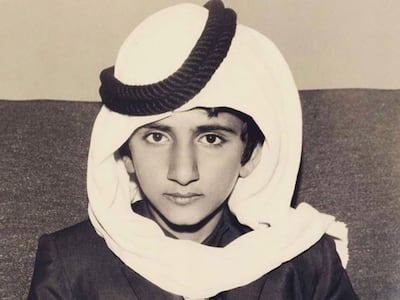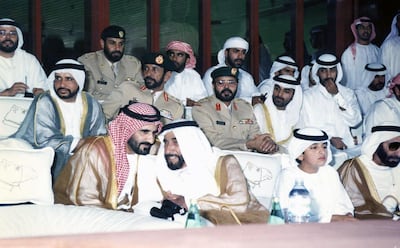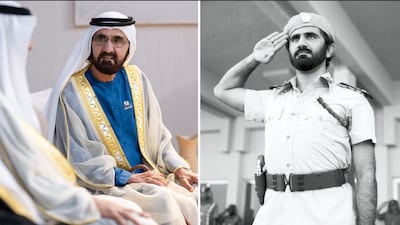It was December 2009, when the world was in the grip of the financial crisis, and with widespread international pessimism about the future of Dubai, that Sheikh Mohammed bin Rashid, Vice President and Ruler of Dubai, decided to go for a walk.
He parked his car and strolled among the crowds at the Souq Madinat Jumeirah, pausing at intervals to speak with tourists and locals alike, all somewhat astonished at his presence.
One Indian woman asked to take a photograph with him and when the Ruler agreed, she suddenly realised she did not have a camera. A member of Sheikh Mohammed’s security detail was sent shopping at the Jumeirah Beach Hotel to buy one, the photograph was taken, then the camera presented to the delighted woman.
The anecdote is recalled on the opening pages of a new authorised biography of Sheikh Mohammed, with the Dubai-based British author, historian and documentary maker Graeme Wilson explaining: “The difference between the man in the kandura and the delighted people he was meeting was that he had never for one moment doubted, even in the darkest days, that positivity and confidence in the future would conquer all.”
Titled To Be The First, the book is a 351-page journey through Sheikh Mohammed’s earliest years at the home of his grandfather, Sheikh Saeed bin Maktoum, through his education and appointment as Crown Prince to the present day, as Ruler of Dubai.

'An inbuilt competitive drive'
While drawing on Sheikh Mohammed’s own account of his life, the book includes stories from many of those who know him best, revealing a portrait of a brilliant and complex man, never afraid to make difficult decisions, always pushing those around him to achieve more, but with compassion for those less fortunate.
The strength of his personality became obvious even as a toddler, when his cousin Sheikh Mohammed bin Khalifa reveals he was always getting into trouble.
“When we played hide-and-seek, he would find somewhere to hide and, with that inbuilt competitive drive, determinedly stay hidden even when the game had ended and we were all calling for him to come back. Sheikha Latifa [his mother] was constantly trying to find him.”
Later, school was something to be endured rather than enjoyed, with Sheikh Mohammed not spared from the clipped ears or taps from a wooden ruler that his first teacher in Dubai employed to keep discipline. Still, the future Ruler worked hard and did well in his exams, while developing a love for the natural world that inspired him to keep a small menagerie of creatures in the family home.
At 17, his father Sheikh Rashid decided his son needed to improve his English and he was sent to a language school in Cambridge, England. Dr Abdullah Omran Taryam, a former UAE minister and friend of the family, recalls that Sheikh Rashid had one overriding instruction for the teenager before he departed.
“When he eventually returned to Dubai, his official responsibilities would start in earnest. That period in Europe was likely his last opportunity to live as a ‘normal’ person. This is what the Ruler wanted, to offer his boy a last hurrah; a time when Sheikh Mohammed could exist in his own space.”
Lifelong passions formed in the UK
In Cambridge, Sheikh Mohammed boarded with a local family, Barry and Jo Summers. Saturday evenings might be spent watching football on the BBC’s Match of the Day TV programme, where he liked to follow the fortunes of Liverpool and Arsenal.
A trip to the cinema and a bag of popcorn was an inexpensive night out and way to improve his English. A favourite film was Dr Zhivago, starring the Egyptian actor Omar Sharif. Sheikh Rashid bought his son an Aston Martin DB6, and allowed him to visit London. A significant outing was a trip to Newmarket Racecourse, in Suffolk, eastern England, in May 1967, where Sheikh Mohammed saw Royal Palace win the 2000 Guineas, sparking a lifelong passion for horses and racing.
Sheikh Mohammed returned to the UK in 1968 to train at the Mons Officer Cadet School in Aldershot, south-east England, where no special treatment was offered. An officer at the school reported that: “Like all others, he polished his own boots, cleaned his own living space and took his turn to scrub the floors and clean the toilets. No one escaped these basic duties.”
Some compared life at Mons with conditions in prison, but the 18-year-old thrived, even when long marches in harsh terrain left his feet a mass of blisters and blood. But it was now time to return to Dubai and begin his official duties as a son of the Ruler.
Stories about Sheikh Mohammed in public life confirm his unwavering belief in Dubai’s future, but also his expectations of those who would help him build it. Looking at the plans for Dubai Duty Free in 1983, he ordered it to be doubled in size. Setting up the new airline two years later he rejected the name Dubai Air, saying: “Call it Emirates, and put the flag on the tail.”

A determination to succeed
Ignoring naysayers, he pushed ahead with plans to make Dubai an international tourist destination. Gerald Lawless, the founding chief executive of the Jumeirah group, remembers keeping a set of clean clothes next to his bed ready for a summons even in the middle of the night that would almost certainly come.
“During my career, I have managed properties all over the world and never seen the owner. This one has dozens of hotels, and also a country to run, and still finds time to see that things were running to his personal satisfaction,” he said. “Sheikh Mohammed works 18 hours a day, so you have to be prepared. That is the deal when you work for him.”
Dr Taryam agreed, adding: “Meetings would finish at 11pm and we would head off into the night, relieved to be heading for our beds, only to be called back a few hours later as Sheikh Mohammed had started his next working day on three hours sleep.”
Sheikh Mohammed rejected the initial plans for The Palm Jumeirah, originally a circular island, instead sketching out the now familiar Palm design because he realised it offered more beach frontage for properties and hotels. Shown the first design for what would be the Burj Khalifa, he was told, at 90 storeys, it would be the tallest building in Dubai. Sheikh Mohammed is said to have replied: “Ninety is tall, but it is not the tallest, is it? Review the tallest buildings in the world, then come back and see me.” The completed building has 163 storeys.
The biography confirms Sheikh Mohammed has no time for slackers, visiting government offices first thing in the morning and catching latecomers, issuing final warnings and sometimes dismissals. At the same time, he has consistently promoted humanitarian missions around the world, while the book details his devotion to horses, expressed in his Godolphin Stables and personal successes in the sport of endurance riding.
The world is also familiar with Sheikh Mohammed’s love of writing nabati poetry. Perhaps less well known is that he is also equally well versed in coffee brewing, enjoying blends from Yemen to the Ivory Coast.
Reem Al Hashimy, Minister of State for International Co-operation, recalls a moment during the Covid-19 pandemic, when Sheikh Mohammed spotting she was drinking from an Expo 2020 coffee mug.
He asked, teasingly, “Reem, what type of coffee are you drinking?” Wilson notes: “Discussion turned to whether the minister was sipping on a special blend, or a routine coffee from Costa. It was a moment of levity amid virus-strained uncertainty.”
To Be The First, the authorised biography of Sheikh Mohammed bin Rashid Al Maktoum by Graeme Wilson, is published by Motivate.














